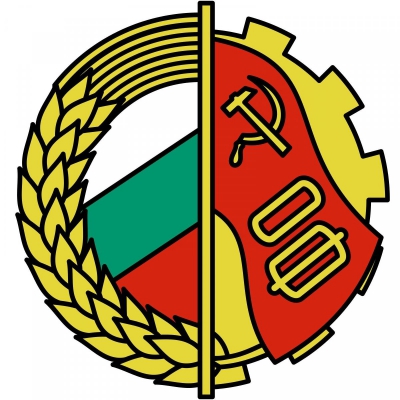The 1944 Bulgarian coup d'tat, also known as the 9 September coup d'tat (Bulgarian: , romanized: Devetoseptemvriyski prevrat), was the forcible change of the government of Kingdom of Bulgaria carried out on the eve of 9 September 1944. In the People's Republic of Bulgaria it was called People's Uprising of 9 September on the grounds of the broad unrest, and Socialist Revolution as it was a turning point politically and the beginning of radical reforms towards socialism.
The Fatherland Front (Bulgarian: Отечествен фронт, ОФ, romanized: Otechestven front, OF) was a Bulgarian pro-communist political resistance movement, which began in 1942 during World War II. The Zveno movement, the communist Bulgarian Workers Party, a wing of the Bulgarian Agrarian National Union and the Bulgarian Social Democratic Workers Party all became part of the OF. The constituent groups of the OF had widely contrasting ideologies and had united only in the face of the pro-German militarist dictatorship in Bulgaria. At the beginning, the members of the OF worked together, without a single dominating group. Professional associations and unions could be members of the front and maintain their organisational independence. However, the Bulgarian Communist Party soon began to dominate. In 1944, after the Soviet Union had declared war on Bulgaria, the OF carried out a coup d'état (9 September 1944) and declared war on Germany and the other Axis powers. The OF government, headed by Kimon Georgiev of Zveno, signed a ceasefire treaty with the Soviet Union (28 October 1944). In the summer of 1945 most of BANU led by Nikola Petkov and most of the Social-Democrats had left the OF and became a large opposition group which later on after the 1946 Grand National Assembly election would become a coaltion named "Federation of the vilage and urban labour" with 99 MPs out of 465.On November 18, 1945, the OF won a large majority in national elections. In November 1946 Georgiev resigned as Prime Minister and was succeeded by Georgi Dimitrov, leader of the communists. Bulgaria became a People's Republic on 15 September 1946 after a referendum. In 1948 and 1949 all the ramaining parties in the OF save for the pro-communist wing of the BANU have self-dissolved and merged into the BCP. The OF eventually transformed into a wide-ranging popular front under overall Communist control. With the fall of communism in Bulgaria the Fatherland Front was dissolved in 1990.

1944Sep, 9
World War II: The Fatherland Front takes power in Bulgaria through a military coup in the capital and armed rebellion in the country. A new pro-Soviet government is established.
Choose Another Date
Events on 1944
- 10Apr
Auschwitz concentration camp
Rudolf Vrba and Alfréd Wetzler escape from Birkenau death camp. - 13Apr
Soviet Union
Diplomatic relations between New Zealand and the Soviet Union are established. - 26Jun
RAF
World War II: San Marino, a neutral state, is mistakenly bombed by the RAF based on faulty information, leading to 35 civilian deaths. - 26Aug
Charles de Gaulle
World War II: Charles de Gaulle enters Paris. - 31Dec
Nazi Germany
World War II: Hungary declares war on Nazi Germany.

 English
English  español
español  français
français  português
português  русский
русский  العربية
العربية  简体中文
简体中文 